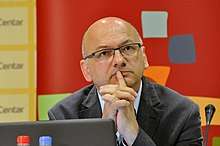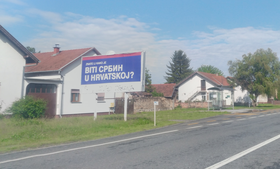Dejan Jović
Dejan Jović (Serbian Cyrillic: Дејан Јовић; born 12 April 1968)[1] is political scientist from Croatia. He is a full-time professor at the Faculty of Political Science at the University of Zagreb. He is also main editor of the Croatian Political Science Review, one of the leading academic journals in political science and social science in Southeastern Europe. Dejan Jović is a specialist in Yugoslav and post-Yugoslav politics as well as foreign policies and theories of international relations.[2]
Dejan Jović | |
|---|---|
 Dejan Jović at the Media Center Belgrade in 2018 | |
| Born | 12 April 1968[1] |
| Alma mater | University of Zagreb (Undergraduate) University of Ljubljana (Master) |
| Occupation | Academic |
| Employer | University of Stirling University of Zagreb |
Biography
Early life
Dejan Jović was born in Samobor, town in the Zagreb metropolitan area, on 12 April 1968 during the time of the Socialist Republic of Croatia. In an interview he described himself as both Croat and Serb, acknowledging that such a complex self-determination may cause shock among some members of both communities who are used to totalitarian nationalism and are unaccustomed to liberal identity approach.[3]
Education
Dejan Jović completed his undergraduate studies at the University of Zagreb in 1990,[4] master level studies at the University of Ljubljana in Slovenia and University of Manchester in England in 1994[4] and PhD studies at the London School of Economics and Political Science in 1999.[1] At the LSE Jović defended his doctoral thesis under the title "The breakdown of elite ideological consensus: The prelude to the disintegration of Yugoslavia (1974-1990)" under the primary supervision of Chris Binns and with the support of the Overseas Research Support Grant, the LSE Graduate Scholarship, and the Open Society Fund Grant.[5]
Academic Career
Dejan Jović has been a Jean Monnet Fellow at the European University Institute in Florence and a lecturer at the Scottish University of Stirling.[6] At the University of Stirling Jović was founder and director of the Centre for European Neighborhood Studies.[4] Since 2015 he is guest professor at the University of Belgrade.[1] Dejan Jović is the main editor of the Croatian Political Science Review journal since 2013.[1] According to SCImago Journal Rank the Croatian Political Science Review was Q1 best quartile journal in the field of History in 2018.[7] It was the sixth highest ranked political science and international relations journal in the entire Eastern Europe and 257th internationally among 503 ranked journals.[8][9] In the field of History it was 10th among 109 ranked journals in Eastern Europe and 278th among 1217 ranked journals internationally.[10][11]
Publications
Books[12]
- Rat i mit: Politika identiteta u suvremenoj Hrvatskoj (English: War and Myth: The Politics of Identity in Contemporary Croatia). Zaprešić: Fraktura. 2017.
- Yugoslavia: A State that Withered Away. West Lafayette, Indiana, United States: Purdue University Press. 2009.
- Jugoslavija - država koja je odumrla (English: Yugoslavia: A State that Withered Away). Zagreb & Belgrade: Prometej & Samizdat B92. 2003.
- Причините за распаѓањето на СФРЈ (English:Disintegration of Yugoslavia: Causes and Interpretations). Skopje: Templum. 2003.
Edited Books[12]
- Marksističke teorije međunarodnih odnosa (English: Marxist Theories of International Relations). Zagreb: Faculty of Political Science. 2018.
- Konstruktivističke teorije međunarodnih odnosa (English: Constructivist Theories of International Relations). Zagreb: Faculty of Political Science. 2016.
- Liberalne teorije međunarodnih odnosa (English: Liberal Theories of International Relations). Zagreb: Političke analize & Faculty of Political Science. 2014.
- Teorije međunarodnih odnosa: Realizam (English: Theories of International Relations: Realism). Zagreb: Politička kultura. 2013.
- Slobodan Milošević: put ka vlasti (English: Slobodan Milošević: Road to Power). Belgrade & Stirling: Institute for Contemporary History & Centre for European Neighbourhood Studies. 2008.
Political and public engagement
Jović was special advisor at the Ministry of Foreign and European Affairs between 2004 and 2006. In the period between 2010 and 2014 Jović was the main political analyst for the President of Croatia Ivo Josipović.[4] In 2017, he has signed the Declaration on the Common Language of the Croats, Serbs, Bosniaks and Montenegrins.[13]
2019 European Parliament election

In 2019 Jović was on the election list of the Independent Democratic Serb Party for the 2019 European Parliament election in Croatia.[14] In an interview for Italian Osservatorio Balcani e Caucaso Transeuropa he explain his motivation to run as a non-party candidate on SDSS list by "desire to influence European politics" particularly related to Western Balkan integrations, academic duty to take active part in political life and to "express my solidarity with the Serbian community, not so much because of ethnicity, but because I think that the Serbian community is a trait of Croatia as a country".[14] Jović was second on the list, just behind party leader Milorad Pupovac.[15] Campaign was marked by SDSS jumbo posters with inscription "Do you know how it is to be a Serb in Croatia?" in which a word Serb was written in Serbian Cyrillic.[15] As it was expected by campaign leaders jumbo posters were target of widespread nationalist vandalism and destruction which underlined the issue of ethnic intolerance and discrimination.[15] The party did not manage to reach 5% threshold to enter the European Parliament and instead received 28,597 votes or 2.66% yet some commentators perceived campaign as an important public relations success and results as expected.[16]
Criticism and controversies
In 2014, when serving as senior advisor to president, in his positive book review for the Croatian Political Science Review Jović express approval of the book "First Do No Harm: Humanitarian Intervention and the Destruction of Yugoslavia" written by David N. Gibbs and published by Vanderbilt University Press in 2009. The book challenged the idea that the United States and its allies could stage humanitarian interventions that would end ethnic strife and included extended critique of Samantha Power’s book "A Problem from Hell: America in the Age of Genocide".[17] Gibbs' book was therefore considered controversial by British historian Marko Hoare for allegedly denying the genocide in Srebrenica and for other controversial views.[18] Jović was thus, due to his positive review of the book, accused by the North American Congress Of Bosniaks of "silently denying Serbian aggression and genocide".[19] Hoare previously criticized his book "Slobodan Milosevic’s place in Serbian History", accusing Jović of being an apologist of Slobodan Milošević and the JNA during the war in the 1990s.[20][21] Former professor at Yale University, Ivo Banac described Jović as an "ordinary falsifier of history".[22] Jović responded by stating that the accusations are "completely tendentious and incorrect, and the campaign itself has political rather than academic motives", he also defended Gibbs by claiming he had never denied genocide in Srebrenica, that he is a distinguished professor of history at the University of Arizona whose book had a number of positive reviews in academic journals, and that the same people who are now accusing him as a genocide denier for a book review have previously accused many, including the Washington Times and The Guardian that they are genocide deniers.[23] His claims were, however, disputed by Hoare in a subsequent response to his response which stated "It is dangerous to both Croatia and Bosnia-Hercegovina for someone holding such views, and with such poor analytical judgement and grasp of reality, to occupy the position that he does.".[24][20]
During the same year, he was sacked by president Ivo Josipović after Jović claimed in his article that 1991 Croatian independence referendum was "very non-liberal. Maybe they were ‘democratic’ if by ‘democracy’ we mean only the determination of those who have more and who less [votes]. But they were certainly not liberal"[25] and that it can not be compared with Scottish independence referendum arguing that, unlike the Croatian one, every opinion was considered legitimate and was equally present in public debate. This statement was described by president Josipović as "malicious and false".[26] President sacked him shortly before 2014–15 Croatian presidential election while politicians from major opposition right-wing Croatian Democratic Union expressed opinion that he was sacked because his opinions were damaging Josipović's reelection prospects.[27] The left-leaning British political website openDemocracy opined that sacking of Jović was the result of "(re)establishment of a certain dogmatism in interpreting or discussing about the past".[28] Balkan Insight described Jović's statements as "highly controversial" and politicians from both SDP and HDZ criticized Jović, while 24sata columnist Tomislav Klauški criticised Josipović’s move instead and asked if it is possible to comment meaningfully and non-passionately the independence referendum 23 years after it took place .[25]
References
- "Dejan Jović". Frantura. Retrieved 1 May 2018.
- "Dejan Jović. Professor, Faculty of Political Science, University of Zagreb". Belgrade Security Forum. Retrieved 25 April 2020.
- "Dejan Jović: "Ja sam i Srbin i Hrvat"". Autograf. Retrieved 1 May 2018.
- "Profili djelatnika > Dejan Jović". Faculty of Political Science. Retrieved 1 May 2018.
- Jović, Dejan (1999). The breakdown of elite ideological consensus: The prelude to the disintegration of Yugoslavia (1974-1990) (PhD). London School of Economics and Political Science. Retrieved 30 April 2020.
- "Dejan Jović - Biography". Who is Who in Croatian Science. Retrieved 1 May 2018.
- "Politička misao". SCImago Journal Rank. Retrieved 25 April 2020.
- "Journal ranking Eastern Europe". SCImago Journal Rank. Retrieved 25 April 2020.
- "Journal ranking". SCImago Journal Rank. Retrieved 25 April 2020.
- "History Journal ranking Eastern Europe". SCImago Journal Rank. Retrieved 25 April 2020.
- "Journal History ranking". SCImago Journal Rank. Retrieved 25 April 2020.
- "Hrvatska znanstvena bibliografija: Dejan Jović". Hrvatska znanstvena bibliografija. Retrieved 25 April 2020.
- Derk, Denis (28 March 2017). "Donosi se Deklaracija o zajedničkom jeziku Hrvata, Srba, Bošnjaka i Crnogoraca" [A Declaration on the Common Language of Croats, Serbs, Bosniaks and Montenegrins is About to Appear] (in Serbo-Croatian). Zagreb: Večernji list. pp. 6–7. ISSN 0350-5006. Archived from the original on 23 May 2017. Retrieved 5 June 2019.
- Vale, Giovanni (24 June 2019). "Dejan Jović, an alarm call for Croatian society". Trento, Italy: Osservatorio Balcani e Caucaso Transeuropa. Retrieved 25 April 2020.
- Miladinović, Aleksandar (24 May 2019). "Интервју петком - Дејан Јовић: „Поставили смо огледало пред лице и савест људи"". BBC. Retrieved 25 April 2020.
- Klarić, Jasmin (10 May 2019). "SDSS naravno nema nikakve šanse na EU izborima, ali treba priznati, kampanja im je marketinški super". Telegram.hr. Retrieved 25 April 2020.
- "First Do No Harm: Humanitarian Intervention and the Destruction of Yugoslavia". Project MUSE. Retrieved 30 April 2020.
- Marko Attila Hoare, Genocide, Justice and denial, Centre for Advanced Studies, Sarajevo, 2017; pp. 21-32, pp. 247, pp. 59
- https://www.vecernji.hr/vijesti/kongres-bosnjaka-proziva-josipoviceva-savjetnika-dejana-jovica-916016
- https://www.vecernji.hr/vijesti/savjetnik-predsjednika-josipovica-podrzava-teze-iz-velikosrpskog-pamfleta-918181
- European History Quarterly guest edited by Dejan Djokic, vol. 36, no. 3, July 2006, pp. 445-462.
- https://www.vecernji.hr/vijesti/hrvatsko-proljece-drzao-je-manjinskom-manifestacijom-925792
- Jović, Dejan (21 January 2014). "Odgovor Dejana Jovića". Autograf. Retrieved 29 June 2018.
- https://www.tacno.net/novosti/hoare-jovic-i-gibbs-nastoje-minimalizirati-krivnju-srpskih-agresora-za-rat-1990-i-prebaciti-krivnju-sto-vise-na-hrvatske-i-bosnjacke-zrtve-rata/
- Milekić, Sven (3 October 2014). "Croatian Adviser Axed for Querying Independence Vote". Balkan Insight. Retrieved 27 April 2020.
- https://www.vecernji.hr/vijesti/josipovic-smijenio-svog-savjetnika-dejana-jovica-964717
- "HDZ: Josipović je smijenio Jovića jer mu šteti u kampanji". N1 (TV channel). 2 October 2014. Retrieved 27 April 2020.
- Spasovska, Ljubica (28 October 2014). "'Death to fascism, freedom to expression!' – the post-Yugoslav media and freedom of speech". openDemocracy. Retrieved 29 June 2018.